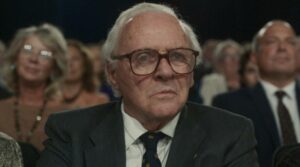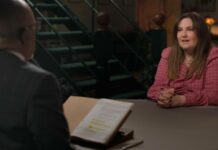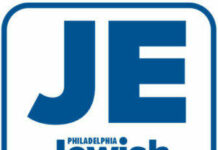
Jackie Hajdenberg
In a 1988 episode of the British television show, “That’s Life,” British stockbroker Nicholas Winton was invited to sit in the audience as host Esther Rantzen dramatically revealed to him that the entire crowd was composed of the Jewish children — now adults — he had saved during the Holocaust.
That tear-jerking clip periodically goes viral on social media, but now, Winton’s story is coming to bigger screens — in a dramatic film, “One Life,” where he is portrayed by two-time Academy Award-winning actor Anthony Hopkins.
Hopkins was the casting choice of Winton’s daughter, who died as it was being filmed, seven years after her father. Already, the movie has ignited criticism — and swift revision — over promotional materials that did not include language about the children’s Jewish identities. The full story about the film’s subject is even more complex, with connections to Ghislaine Maxwell, a gold ring, the Talmud and, of course, the tragic saga of European Jewry.
Winton’s role in that saga was hardly assured. Born to German-Jewish parents in London in 1909, Winton (originally “Wertheim”) was baptized into the Anglican Church and, as an adult, never subscribed to any religion.
At 29, he was a stockbroker planning to ski in Switzerland with friends when his travel partner, schoolteacher Martin Blake called and said the trip was off — he was heading to Prague instead.
“I have a most interesting assignment and I need your help,” Winton recalled Blake saying. “Come as soon as you can. And don’t bother bringing your skis.”
Blake was working with the British Committee for Refugees from Czechoslovakia, an organization established to save Jews and other minority groups targeted by the Nazis in the recently-annexed Sudetenland.
But it was the appeal of a Czech Jewish social worker and activist, Marie Schmolka, that ultimately brought Winton into the Czech Kindertransport-inspired project organized by British university lecturer Doreen Warriner. Schmolka had visited the areas where refugees were concentrated and collected evidence to garner public support, pleading to foreign ambassadors based in Prague and to Jewish agencies abroad, hoping someone would take them in. But Britain would only take unaccompanied children.
For the first three weeks of January 1939, Winton mostly worked out of a hotel in Prague, coordinating and collecting applications from parents seeking homes for their children outside of Czechoslovakia. He also took photographs of the children, which he later said was more persuasive for prospective families than a mere list of names.
Back in Britain, still working his job at the stock exchange, Winton and his assistants and his mother fundraised, collected or forged the children’s travel documents, and also placed advertisements in newspapers to find them foster homes.
On March 14, 1939, the day before Nazi Germany invaded the Czech regions of Bohemia and Moravia, the first of eight trains containing 669 children, mostly Jewish, headed to Britain.
A ninth train was scheduled to depart on Sept. 3, but was halted — Germany had invaded Poland two days earlier, officially starting the war, and the borders were closed. None of the approximately 250 children on that train are known to have survived.
Early in the war, he worked for the Red Cross as an ambulance driver in France and England during the London Blitz, later joining the Royal Air Force training pilots and documenting the destruction he saw with his photography. After the war, he joined the International Refugee Organization, working on the repatriation of Nazi-looted goods.
His work with the children went unnoticed for decades. Then, in the late 1980s, Winton’s wife Grete Gjelstrup discovered a scrapbook in the attic with the children’s names and photos, as well as letters written by their parents.
“I suppose there are quite a number of things that husbands don’t tell their wives,” Winton told Matej Minac, who directed several films about his story.
Gjelstrup brought the book to Holocaust historian Elizabeth Maxwell, the wife of media magnate Robert Maxwell (also the parents of Ghislaine Maxwell, sentenced to prison over her role in Jeffrey Epstein’s sex abuse ring) who brought Winton’s story of saving the hundreds of children to the press, and eventually, to “That’s Life!” where he met some of the children he saved.
Winton was nicknamed “the British Schindler” after German industrialist Oskar Schindler, who saved some 1,200 Jews during the Holocaust. More than 6,000 children and grandchildren of the Czech Kindertransport owe their lives to Nicholas Winton, according to “One Life,” the 2014 book written by his daughter and biographer, Barbara Winton, which inspired the film. Some of their descendants appear as extras in the “That’s Life!” scene.
Upon giving permission for a film adaptation of her book, Barbara Winton made one request: cast Hopkins as her father.
Barbara Winton gave the filmmakers access to her father’s letters and other archival materials.
She died in September 2022, while “One Life” was filming.
“One Life” is a reference to a paraphrased quote from the Mishnah: “Save one life, save the world,” which was inscribed in a gold ring presented to Winton in 1988 at a Holocaust conference organized by Elizabeth Maxwell at Oxford by some of the children he saved.
Controversy arose in early January when the film’s promotional materials in the United Kingdom failed to mention that the majority of the children in danger were Jewish. Instead, some marketing materials referred to the children as “Central European.”
After social media backlash, IMDb, the Warner Bros. U.K. website, and British theater chain Vue changed their film summary to read “predominantly Jewish.”
Nicholas Winton died in 2015 at 106.
Despite going decades without recognition for his heroism, the later years of his life were filled with honors and awards. Winton was knighted by Queen Elizabeth II in 2003 and received the Order of the White Lion, the highest order from the Czech Republic in 2014. He even had a minor planet named after him.
Still, he insisted that his work was not heroic.
“I was never in any danger,” Winton told a British newspaper in 2011. “I took on a big task, but did it from the safety of my home in Hampstead.”







Something most movie-goers will not realise is how well Anthony Hopkins portrays my father, Nicholas Winton. At times it seems as though I’m really looking at Pa on the screen. It is very moving.
It was rather an oversight in failing to acknowledge that most of the children were Jewish, although my father was always clear that he was saving children, not just Jewish children.